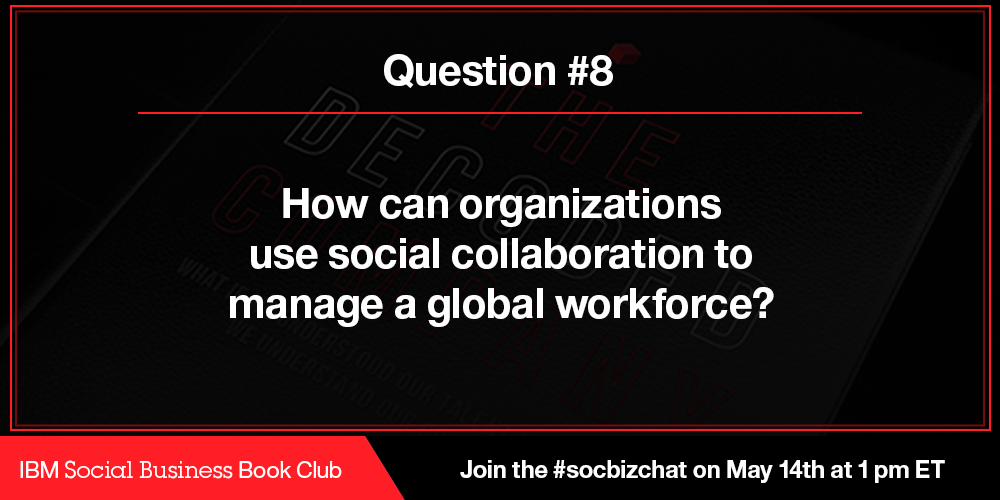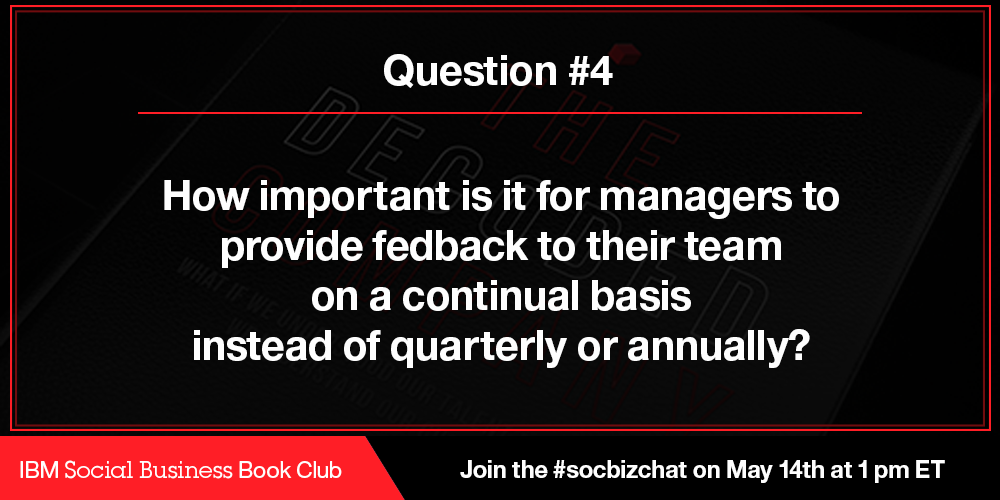
IBM Social Business34






















Q2: Should organizations focus on understanding their employees better? Or their customers? http://www.via-cc.at...

Chris Heuer
thinking either/or is a false choice, which is part of the problem @IBMSocialBiz need more #holistic approach

Leerom Segal
Q2 @IBMSocialBiz Yes. By rejecting the notion that it’s people, are interchangeable resources and eliminating one-size-fits-all solutions, decoded companies understand people better and personalize their processes, policies, and tools to the individual.

Jay Goldman
.@chrisheuer false dichotomy for sure. You can't win with either of them as the single focus.

Casey Lucas
A2: @IBMSocialBiz - Absolutely both!! Without a doubt, they're equally important!!

Leerom Segal
In a similar way to how Amazon, Facebook, Google, and other consumer companies have decoded our preferences to personalize our experiences; Decoded companies use the same big data techniques to understand their own people & curate experiences

Chris Heuer
a2: its really about people as @leeromsegal says - regardless of their title, role or perceived position in the market

Jay Goldman
Q2 I'd say it's a question of which one you focus on first, not to the exclusion of the other. @IBMSocialBiz

Wayne Hendry
@chrisheuer Agree 100%! People (employees and customers) are your greatest asset and source of ROI!

Chris Heuer
a2: as I explained in my Ignite talk at #IBMAmplify engagement must be understood and planned across every relationship of an organization

Jay Goldman
A2 We talk in the book about @vineetnayar's employee first perspective. Similar approach. @IBMSocialBiz

Jay Goldman
A2 @chrisheuer very true. Too many companies focus only the external side though. Internal relationships are equal if not more important.

Chris Heuer
@jaygoldman and the chicken/egg problem can become the challenge here, as you end up never being truly complete with understanding and supporting one, so some don't get to even thinking about the other - so customers often win the ceo's attention more

Daniel Davis
Are there fundamental differences (in approach or otherwise) in understanding employees vs. understanding customers?

Wayne Hendry
@leeromsegal Oh I like this as understanding engagement is huge!

Jay Goldman
.@danielkdtwt you can use a lot of the same approaches and technology. We talk about #DigitalBodyLanguage — the bits are different internally but the theory is the same.

Chris Heuer
@danielkdtwt one of the differences is naturally in regards to motivation and reward for the level of #engagement

Jay Goldman
.@ideakid88 hiring the right people and keeping them engaged is the single most strategic thing that leaders can do

Daniel Davis
It seems that orgs have also been collecting (or trying to collect) data on customers for a long time now, but only recently have they been moving beyond performance reviews to collect data on employees.

Chris Heuer
@danielkdtwt another thing to think about is the alignment of purpose and passion - if the org is made up of people only concerned with the paycheck and aren't actually a potential customer, its harder for them to understand each other

Leerom Segal
The companies that invest in understanding #DigitalBodyLanguage can thereby reduce bureaucracy and that allows them to execute and evolve faster

Chris Heuer
@danielkdtwt more companies are starting to hire from their existing customer base (I hope to see even more doing this soon)

Wayne Hendry
@chrisheuer Interesting!

Daniel Davis
@chrisheuer I hadn't heard of that practice! That's really interesting actually, and adds a whole new dynamic to the company-customer relationship!








